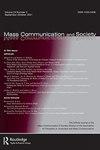Can News Literacy Help Reduce Belief in COVID Misinformation?
IF 2.7
2区 文学
Q1 COMMUNICATION
引用次数: 5
Abstract
ABSTRACT The rapid spread of misinformation during the COVID-19 pandemic has increased calls for news literacy to help mitigate endorsement of misinformation, conspiracy theories, and other falsehoods. In two cross-sectional online surveys conducted in October 2020 (N = 1,502) and July 2021 (N = 1,330), this study examines relationships between news literacy, COVID-19 misinformation, conspiratorial thinking, and political orientation in the United States. The results show that individuals with higher levels of news literacy were more likely to reject COVID-19 misinformation and conspiratorial thinking, but also that news literacy matters more for individuals with liberal political views than conservative political views and is unevenly distributed across the study population with age, race, political orientation, and news diet as significant predictors of news literacy. Results suggest that improved news literacy could be part of a strategy to equip individuals to reject health misinformation, but varied approaches will be necessary to engage with disparate groups.新闻素养有助于减少对COVID错误信息的信念吗?
在2019冠状病毒病大流行期间,错误信息的迅速传播增加了对新闻素养的呼吁,以帮助减少对错误信息、阴谋论和其他虚假信息的认可。在2020年10月(N = 1502)和2021年7月(N = 1330)进行的两项横断面在线调查中,本研究考察了美国新闻素养、COVID-19错误信息、阴谋思维和政治取向之间的关系。结果表明,新闻素养水平较高的个体更有可能拒绝COVID-19的错误信息和阴谋思想,但新闻素养对具有自由政治观点的个体比对保守政治观点的个体更重要,并且在研究人群中分布不均匀,年龄、种族、政治取向和新闻饮食是新闻素养的重要预测因素。结果表明,提高新闻素养可能是一种策略的一部分,使个人能够拒绝健康错误信息,但需要采取不同的方法来与不同的群体接触。
本文章由计算机程序翻译,如有差异,请以英文原文为准。
求助全文
约1分钟内获得全文
求助全文
来源期刊

Mass Communication and Society
COMMUNICATION-
CiteScore
6.90
自引率
3.30%
发文量
58
期刊介绍:
Mass Communication and Society" mission is to publish articles from a wide variety of perspectives and approaches that advance mass communication theory, especially at the societal or macrosocial level. It draws heavily from many other disciplines, including sociology, psychology, anthropology, philosophy, law, and history. Methodologically, journal articles employ qualitative and quantitative methods, survey research, ethnography, laboratory experiments, historical methods, and legal analysis.
 求助内容:
求助内容: 应助结果提醒方式:
应助结果提醒方式:


